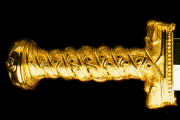Alexander the Great
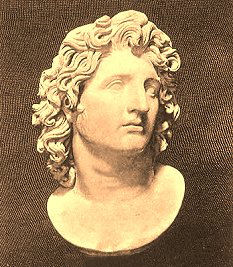
In 323 BC Alexander the Great, king of Macedonia,
ruled a dominion that stretched from the Balkans to the Himalayas and from Egypt to the Caspian Sea.
Possibly the most brilliant soldier in history, he had led a small and poorly
equipped European army on a campaign of over 20,000 miles to conquer the
mighty Persian Empire. Originally from Iran, the Persians held sway over a domain which also
included all of what are now Turkey, Iraq, Afghanistan, Syria, Jordan, Israel and Egypt. It had
taken him twelve years and he was still only thirty-two. Alexander the
Great may have been the undisputed master of the world, but he was a slave to
destiny. He did not die a warrior’s death in battle, but expired as
helpless as a baby in his own bed.
In the summer of that year Alexander had finished his conquest of the Persian Empire and returned to Babylon, the greatest city on earth. Situated on the banks of the River Euphrates, in what is now central Iraq, the city was to be the capital of his new empire. On the night of June 1, in chambers within the royal palace, Alexander was holding a memorial feast to honor the death of a close personal friend. Suddenly, around mid-evening, he was seized with intense pain and collapsed. He was taken to his bedchamber where, after ten days of agony, convulsions and delirium, he fell into a coma and died.
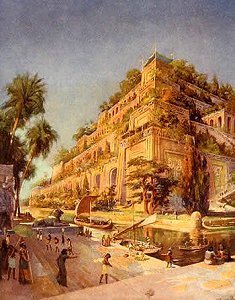
The Hanging
Gardens of Babylon, perhaps the royal palace where
Alexander held his last feast.
(Mary Evans Picture Library)
(Mary Evans Picture Library)
For a map of Alexander’s empire as it was on his death
in 323 BC, click >HERE.
Unlike many events in
ancient history, the details of Alexander’s death have been preserved. The
initial symptoms were agitation, tremors, aching or stiffness in the neck,
followed by a sudden, sharp pain in the area of the stomach. He then
collapsed and suffered acute and excruciating agony wherever he was touched.
Alexander also suffered from an intense thirst, fever and delirium, and
throughout the night he experienced convulsions and hallucinations, followed
by periods of calm. In the final stages of the condition he could not
talk, although he could still move his head and arms. Ultimately, his
breathing became difficult and he fell into a coma and died.
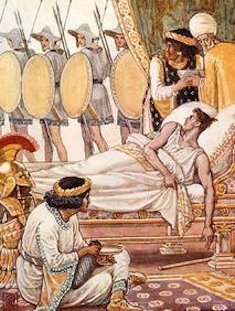
Right: Alexander died in his bed of a mysteriously illness at
the age of 32.
(Mary Evans Picture Library)
(Mary Evans Picture Library)
The three popular theories
concerning the cause of Alexander’s death – Malaria, typhoid and alcohol
poisoning - can now be discounted. Malaria is carried by mosquitoes that live in jungle and tropical locations, but not
in desert regions such as central Iraq where Alexander died. Two years
earlier, Alexander had been in an area of India where
malaria was common. Nevertheless, the disease cannot remain dormant for
this period of time without producing symptoms. Alexander’s life from
the time he was in India is well documented but there is no report whatsoever of a previous illness of this kind. Typhoid is transmitted by food or water contaminated by
bacteria which causes epidemics and not just single, individual cases.
There is nothing in any of the historical accounts to suggest such outbreak
in Babylon at the time Alexander died. The main
effect of alcohol poisoning is continual vomiting, but not once do
any of the historical sources mention vomiting or even nausea as one of
Alexander’s symptoms. One theory that has only recently been proposed is
that Alexander died of an epidemic of the so-called West Nile Virus.
Although a television documentary made the idea popular for a while,
scientists soon pointed out that the virus is only a relatively recent
disease that could not have infected someone over 2000 years ago.
Click >HERE for further discussion of possible causes of Alexander’s death.
So what did kill Alexander?
According to the historical accounts, Alexander’s body failed to show any
signs of decay for six days after death, even though it was kept in a hot,
sultry place. If Alexander’s body had remained preserved for this
amount of time under the conditions described, somehow bacteria had been
prevented from starting the process of decomposition. There could be
only two causes: radiation, which could be discounted for the time, or a
lethal does of a toxic substance that pervaded the corpse. The corpse’s
state of preservation could only have been caused by large amounts of a toxic
substance in the body’s system. Alexander the Great had to have been
poisoned.
Click >HERE for the historical
accounts of the strange preservation of Alexander’s body.
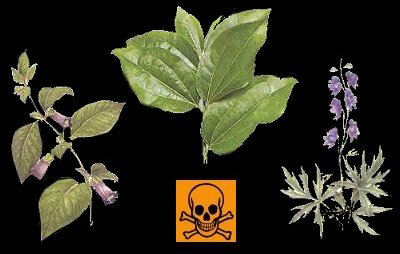
Belladonna, strychnine and aconite: three of the most
poisonous plants in the world. One of these deadly alkaloid toxins was
used to murder Alexander the Great.
The only known
poisons to produce the symptoms from which Alexander is recorded to have
suffered are alkaloid vegetable toxins. Coming from plants, shrubs and
trees, these nitrogen-bearing chemicals especially affect the nervous system,
causing shaking limbs and muscle pains in the back or neck before the victim
experiences severe agony and seizures. Most of the alkaloid
poisons cause stomach pain, and many produce seizures, delirium and
hallucinations; all of which are described in Alexander’s case.
However, the list of poisons that could have killed Alexander can be
shortened considerably because many of the alkaloid toxic plants also produce
severe vomiting and intense headaches that are not reported. With the help
of the Los Angeles County Regional Poison Centre at the University of Southern
California, Graham eventually
narrowed down the poisons to just one: strychnine, which comes from the
fruit of the Nux Vomica tree.
Click> HERE to compare the
historical accounts of Alexander’s death with the symptoms of strychnine
poisoning.
The death of
Alexander the Great is one of history’s most enduring mysteries. What
caused the strong and healthy young ruler of half the known world to die so unexpectedly
at the very height of his power? Historians have proposed malaria,
typhoid and alcohol poisoning as possible causes of death. There have
also been those who have suggested murder, but until now no one has seriously
investigated the possibility.
What Killed Alexander?
Page 2 of 3








